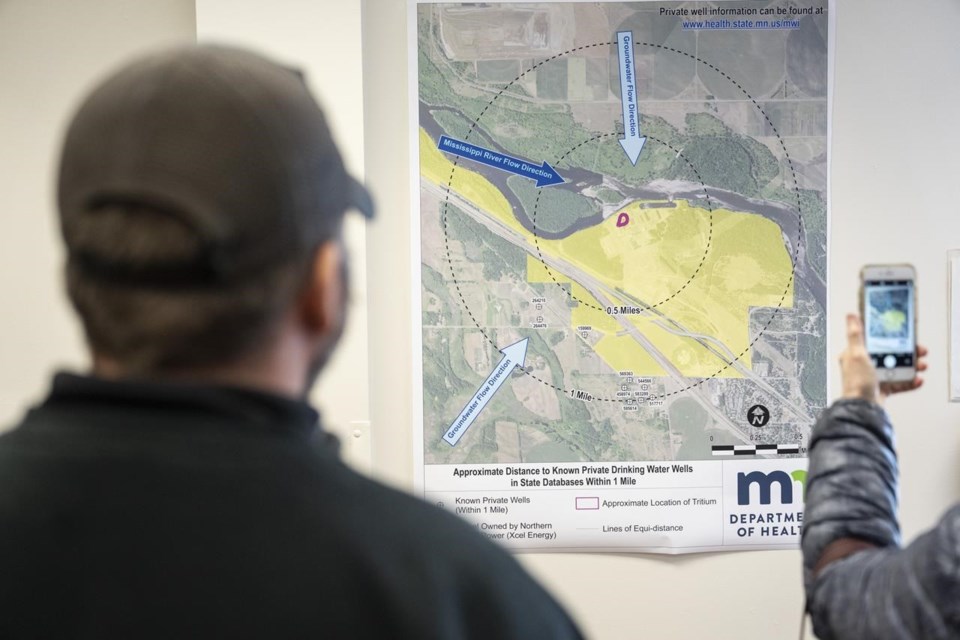MONTICELLO, Minn. (AP) — A Minnesota utility began shutting down a nuclear power plant near Minneapolis on Friday after discovering water containing a low level of radioactive material was leaking from a pipe for the second time. While the utility and health officials say it is not dangerous, the issue has prompted concerns among nearby residents and raised questions about aging pipelines.
Xcel Energy discovered in November that about 400,000 gallons (1.5 million liters) of water containing tritium had leaked. The utility made a temporary fix but learned this week that hundreds more gallons of tritium-laced water leaked, leading to the shutdown decision.
After the plant cools over the next few days, workers will cut out the leaking pipe, which is over 50 years old, said Chris Clark, Xcel Energy's president. The utility will then have the pipe analyzed in hopes of preventing future leaks, he said.
“We could have continued to safely operate the plant and simply repair the catchment, but then, of course, there is always a risk that it would spill over again and have more tritium enter the groundwater," Clark told reporters near the Monticello Nuclear Generating Plant, about 35 miles (56 kilometers) northwest of Minneapolis. “We didn't want to take that chance, so we're bringing the plant down.”
Edwin Lyman, director of nuclear power safety with the Union of Concerned Scientists, said the fact there was a second tritium leak “shines a light on the problem of maintaining aging pipelines” underground at older nuclear plants.
The temporary closure could be out of an abundance of caution, “or it could be a sign they don’t know how bad the problem is, and they need to do a deep dive to find out what’s going on,’’ he said.
Clark said the tritium isn't a risk to drinking water in Monticello or the nearby city of Becker, saying the cities take their water from different areas of the Mississippi River. Even if the tritium reached the river, which Clark assured wouldn't happen, it would dissipate within a few yards, he said.
Clark said the spill had not left the utility’s property.
The utility reported the initial leak to state and federal authorities in late November but didn't make it widely public until last week, raising questions about transparency and public health issues. State officials said they wanted to wait for more details before sharing information widely. Criticism about the delay played a role in Xcel's decision to hold a public information session Friday.
Tritium is a radioactive isotope of hydrogen that occurs naturally and is a common byproduct of nuclear plant operations. It emits a weak form of beta radiation that does not travel far and cannot penetrate human skin, according to the Nuclear Regulatory Commission.
Cindy Remick, of Becker, attended Friday's information session and said she still has concerns that nearby residents, especially those who rely on well water, will be safe. Remick also worries about whether the radioactive material could hurt wildlife.
“We have a very large population here of eagles, and I would like to make sure they're not impacted,” Remick said. “Minnesota is known for our wildlife, and if that (tritium) escapes their plant into the Mississippi, that could be very damaging.”
Tyler Abayare, who was fishing at the Mississippi River near the plant, said he’s been coming to the river every day for five years and usually sees about 15 to 20 others fishing as well.
“Typically this time of year, there’s a lot of families that come out and fish with their children," he said. "Now, after the media released what happened, there’s not a soul in sight, and it just takes away from the recreation and passion of fishing.”
Abayare said he doesn’t believe that the Mississippi River is safe. He doesn’t eat fish he catches and no longer ties his line with his teeth to avoid getting sick.
Nuclear Regulatory Commission inspectors are monitoring the shutdown and repairs, said Victoria Mitlyng, a spokesperson for the agency. She said in a statement the leak “does not present a safety challenge to the public, to drinking water supplies, the plant or the environment.” The leak also did not exceed any agency limits.
Clark said Xcel Energy already had planned to shut down the plant April 15 for nearly a month for refueling, and it wasn't clear if it would immediately reopen after the leak is fixed.
Clark said the leaking pipe is part of the original plant, which opened in 1971. Xcel has applied to extend its operating license at Monticello through 2050.
“We want to inventory the age of everything in the plant and be sure we're dealing with whatever we need to update,” he said.
Tim Judson, executive director of the Nuclear Information and Resource Service, a group that opposes nuclear power, said the second leak “is obviously concerning" and that public worries about possible health risks are exacerbated by the recent toxic train derailment in Ohio, where residents remain concerned about possible health effects despite government pledges that air and water are safe.
“People are seeing what happened in Ohio, and they are distrustful of the government response,’’ Judson said.
___
Daly reported from Washington. Associated Press writer Scott McFetridge in Des Moines, Iowa, contributed to this story.
Trisha Ahmed And Matthew Daly, The Associated Press



